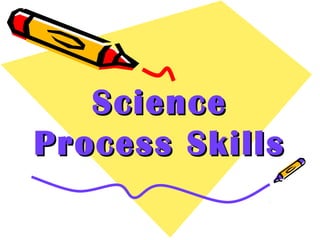
Science Process Skills: Observing, Comparing, Classifying & More
- 2. Logical operations of thinking in investigations. They are either basic or integrated. Basic Process Skills: Observing, comparing, classifying, quantifying, inferring, predicting, communicating and manipulative skills. Integrated Process Skills: Embodied in experimenting which includes hypothesizing, controlling variables and
- 4. 1. OBSERVING most basic and fundamental of the process skills. One cannot compare, classify or perform the other process skills without being a good observer. We observe objects or events through our five senses: sight, smell, touch, taste and hearing. Example: Describing a pencil as yellow
- 5. The Process of observing can be: • Qualitative – this is identifying and naming the properties of an object such as its shape, color, size, texture, smell, and sound. • Quantitative – This kind of observation involves measurement. • Change – it could be the result of crushing, pounding, burning, cutting, decaying, etc.
- 6. 2. COMPARING Comparing is using observable properties in discovering similarities of and differences between objects and phenomena. Through comparison, we are able to identify relationships among objects and phenomena observed.
- 7. 3. CLASSIFYING There is an overwhelming number of things around us – nonliving and living things. Order can be attained by observing similarities, differences and interrelationships and by grouping them accordingly to suit some purpose. Example: Placing all rocks having certain grain size or hardness into one group.
- 8. 4. INFERRING While observing is getting information by using one or more senses, inferring is explaining or interpreting an observation. Example: Saying that the person who used a pencil made a lot of mistakes because the eraser was well worn.
- 9. 5. PREDICTING Predicting is the process of using past observations or data along with other kinds of scientific knowledge to forecast event or relationships. A statement not based on observation is not a prediction. It is simply a guess. Interpolation – is predicting new data based on and within a trend/ pattern of previously observed data. Extrapolation - is predicting new data outside or beyond the range of previously observed data.
- 10. 6. QUANTIFYING Quantifying is making and manipulating quantitative observations. This involves: 1. Using numbers 2. measuring 3. using time and space Example: Using a meter stick to measure the length of a table in centimeters.
- 11. 7. COMMUNICATING Expressing ideas in many forms, such as orally, in writing or with graphs, diagrams, tables of data or photographs is a way of communicating. Example: Describing the change in height of a plant over time in writing or through a graph.
- 12. 8. MANIPULATIVE SKILLS These skills involve using equipment and materials properly and accurately, preparing setups for investigation, and handling specimen carefully.
